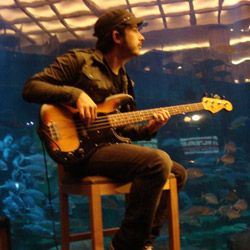1. What would you say is the most important thing to remember while performing onstage?
The most important thing to remember while performing on stage is…have fun! I’m a firm believer that passion inspires passion. So, if you are genuinely enjoying yourself on stage and having a good time, you’ll end up inspiring the audience members to have a good time also.
2. How do you strike a balance between maintaining an energetic stage presence without upstaging the lead or other band members?
I think you definitely have to be mindful of the type of band you’re playing for. Some bands want you to be flashy and out front, and others want you to sort of chill out and stay more in the background. I’ve played for artists that have put me up at the front of the stage and told me to just go for it…and they aren’t too concerned with me upstaging them. Most people are there to see the lead person anyway, so unless you’ve painted yourself with glitter and are jumping around like a jackrabbit, it’s pretty hard to upstage the lead singer…especially if they are charismatic. With The Fray, my position on the stage is next to the drum riser, so I’m not really in a place to get out on the front edge and upstage anyone. So, I just keep my energy up back there and have fun.
3. How do you stay engaged with the band throughout a show? How do you read other band member’s cues?
The goal of most bands should be to get to that point where you know how to communicate on stage without using words. It’s obviously very loud on stage, and we are usually wearing in-ear monitors…so we can’t communicate verbally. Eye contact becomes very important at that point. But, a lot of that instinct to know how to read each other’s cues comes with time. The longer you play together, the more you start to learn each other’s nuances and musical habits.
4. How much of your stage show is rehearsed and how much of it is ad lib?
Ha…it’s definitely not very rock and roll to admit that you rehearse or choreograph your movements on stage. The Fray’s live show is definitely not choreographed. Every now and then there will be something that’s planned, like Isaac, the lead singer coming out into the audience at a specific point; but honestly, that’s mostly for safety’s sake so security can be standing by. That said, there are people who have come out in the past and evaluated the live shows and made suggestions about what looks good and what doesn’t. That is very helpful. Sometimes you’re doing something that looks sort of funny and you don’t realize it until someone tells you.
5. Explain the importance of having a rehearsed live show. What changes for the artist when the show is tight? What changes for the audience?
There’s no doubt the audience will have a better time if the artist/band is having a good time. But, if you’re worried the whole show about hitting the right chords or remembering what section is coming up next, it’s pretty hard to relax and enjoy it. The Fray usually blocks out a chunk of time before going out on the road to do a comprehensive rehearsal. That usually happens with full production and tech crew present so everyone is on the same page. Then once we are on tour, we’re playing pretty much every day or every other day, so everything stays pretty fresh on our minds. But, if we are rehearsed and confident in what we are doing, it’s much easier to relax and have fun with the music and interact with the audience more.
6. Tell us about a time where you tried something new visually on stage and it really worked. (ie: different movement, change in arrangement, etc.
One thing The Fray has done, especially on this new album cycle, is try to get Isaac off of the piano a bit more during the show. For several years there, he was sort of tied down to sitting at the piano because the songs are basically piano-driven. They’ve recently added another player to the show though – a guy named Jeff Linsenmeier who takes over on keys in portions of the show so Isaac is more free to get up and interact with the audience and move around a lot more. It’s made the live show a lot more exciting.
For my part, I’ve learned a few tricks that help me connect with the audience a bit more. One thing is to actually pick my head up more and look out into the audience. Sometimes it’s easy to stay in your world and look down, or close your eyes and that helps you to get into it a little more, but it’s important to make sure you’re connecting with the audience too. I try not to make eye contact with any one particular person, but I look out into the audience and it gives them the feeling that we are together in this thing.
7. How can a bassist (or any other band member) find new ways of expressing themselves on stage instead of always defaulting to the same old standard moves onstage? How do you get creative with your movement?
I know this sounds super cheesy, but watching videos of yourself perform is really helpful. The first show I ever played with The Fray was on Jay Leno actually and there was no rehearsal. I had to just jump in and do it. So, I was obviously very nervous. When I went back and watched the video of that performance, I realized how absolutely stiff I looked. That helped me see what I needed to do to improve. Sometimes you feel like you’re moving around a lot, but then you look back at the video and realize you weren’t at all.
8. What moments in The Fray’s live shows do audience members seem to connect with the most and why do you think that is?
Audiences seem to connect most with moments where there is interaction. Sometimes Isaac will stop singing and let the audience take over. They LOVE that. Part of why people come to shows, is they love to watch bands/artists do something that they either feel like they can’t do, or something they wish they could do. I think that’s why people love to sing in the shower or in their cars; it just feels good to let go and sing even if it sounds horrible. So in a live setting, where there are thousands of people around them and no one can hear each other, they really seem to love to sing out. My Dad taught me something a long time ago that I’ve found to be more and more true the longer I’m in the business: “Entertainment has very little to do with talent.” That’s sort of a tongue-in-cheek statement, but the truth is: sometimes making sure you’re keeping the audience engaged is more important than hitting every single note perfectly.

 Listen Live
Listen Live
Leave a Reply
You must be logged in to post a comment.